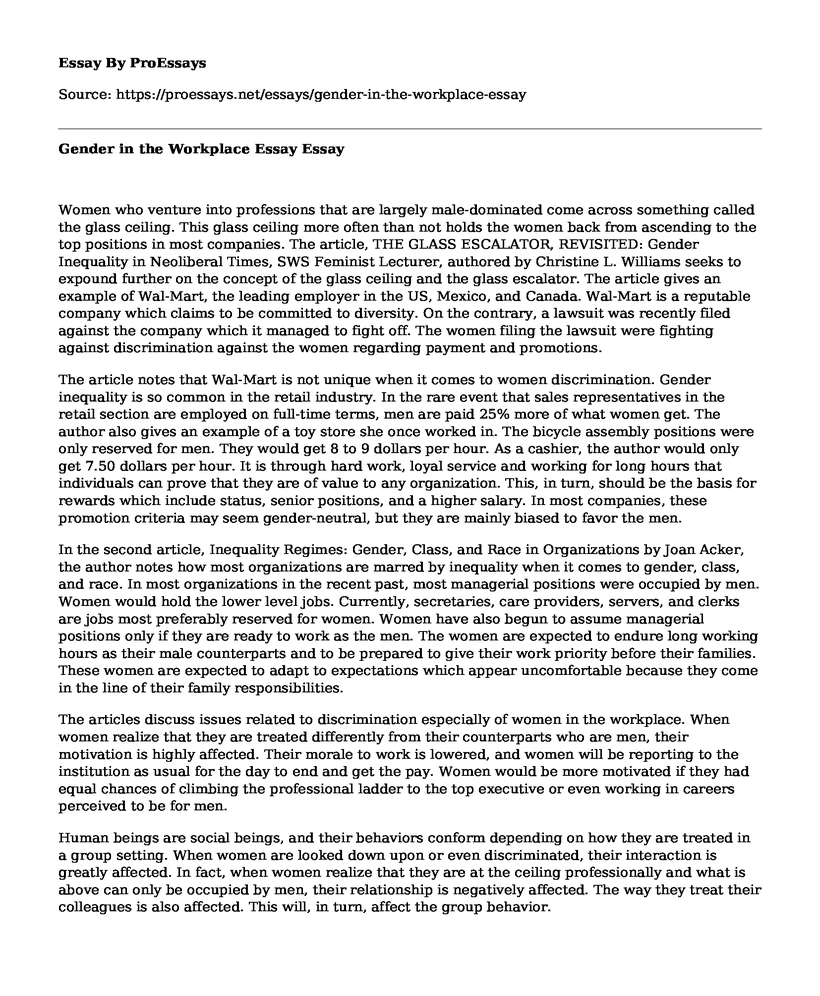Women who venture into professions that are largely male-dominated come across something called the glass ceiling. This glass ceiling more often than not holds the women back from ascending to the top positions in most companies. The article, THE GLASS ESCALATOR, REVISITED: Gender Inequality in Neoliberal Times, SWS Feminist Lecturer, authored by Christine L. Williams seeks to expound further on the concept of the glass ceiling and the glass escalator. The article gives an example of Wal-Mart, the leading employer in the US, Mexico, and Canada. Wal-Mart is a reputable company which claims to be committed to diversity. On the contrary, a lawsuit was recently filed against the company which it managed to fight off. The women filing the lawsuit were fighting against discrimination against the women regarding payment and promotions.
The article notes that Wal-Mart is not unique when it comes to women discrimination. Gender inequality is so common in the retail industry. In the rare event that sales representatives in the retail section are employed on full-time terms, men are paid 25% more of what women get. The author also gives an example of a toy store she once worked in. The bicycle assembly positions were only reserved for men. They would get 8 to 9 dollars per hour. As a cashier, the author would only get 7.50 dollars per hour. It is through hard work, loyal service and working for long hours that individuals can prove that they are of value to any organization. This, in turn, should be the basis for rewards which include status, senior positions, and a higher salary. In most companies, these promotion criteria may seem gender-neutral, but they are mainly biased to favor the men.
In the second article, Inequality Regimes: Gender, Class, and Race in Organizations by Joan Acker, the author notes how most organizations are marred by inequality when it comes to gender, class, and race. In most organizations in the recent past, most managerial positions were occupied by men. Women would hold the lower level jobs. Currently, secretaries, care providers, servers, and clerks are jobs most preferably reserved for women. Women have also begun to assume managerial positions only if they are ready to work as the men. The women are expected to endure long working hours as their male counterparts and to be prepared to give their work priority before their families. These women are expected to adapt to expectations which appear uncomfortable because they come in the line of their family responsibilities.
The articles discuss issues related to discrimination especially of women in the workplace. When women realize that they are treated differently from their counterparts who are men, their motivation is highly affected. Their morale to work is lowered, and women will be reporting to the institution as usual for the day to end and get the pay. Women would be more motivated if they had equal chances of climbing the professional ladder to the top executive or even working in careers perceived to be for men.
Human beings are social beings, and their behaviors conform depending on how they are treated in a group setting. When women are looked down upon or even discriminated, their interaction is greatly affected. In fact, when women realize that they are at the ceiling professionally and what is above can only be occupied by men, their relationship is negatively affected. The way they treat their colleagues is also affected. This will, in turn, affect the group behavior.
To eliminate gender inequality in the workplace, it would be important for human beings to take all professions equally in such a way that as a boy grows up, he knows he can work as a nurse. Similarly, girls should grow up with the mindset that they can be carpenters or even Masons. Also, employers need to be proactive in welcoming women to their places of work. Promotions to be done based on what one can offer in the institution and not by gender. Again, companies and employers should have a 50-50 gender balance in the employee composition from the lowest ranked employee to the top executive. Lastly, it is vital to make gender equality part of the day to day training. Young people need to be fully supported in developing their career path regardless of the gender. By so doing, gender equality will be achieved fully.
References
Acker, J. (2006). Inequality regimes: Gender, class, and race in organizations. Gender & society, 20(4), 441-464.
Williams, C. L. (2013). The glass escalator, revisited: Gender inequality in neoliberal times, SWS feminist lecturer. Gender & Society, 27(5), 609-629.
Cite this page
Gender in the Workplace Essay. (2022, Apr 04). Retrieved from https://proessays.net/essays/gender-in-the-workplace-essay
If you are the original author of this essay and no longer wish to have it published on the ProEssays website, please click below to request its removal:
- Treatment Planning for the Addicted Person
- Research Paper on Substance Abuse in the Workplace
- Response Paper on Data Security
- Ear Pod That Translates Languages Paper Example
- Essay on Managing Change Successfully: Implementing an Interprofessional Collaboration Project
- Teamwork & Collaboration: Enhancing Patient Care - Essay Sample
- Paper Example on Public Attitudes Towards Homelessness and Mental Illness







